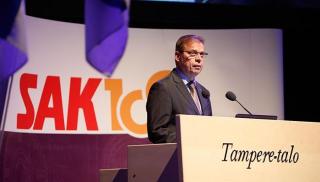Competitiveness Pact helps businesses create jobs
“A business with a staff of sixty employees will be in a position to hire the work input of three employees with no increase in labour costs at all. Two of these employee positions will be made available by reduced employer contributions, while one will be a consequence of longer working hours,” Lyly explained at the SAK Congress on Monday.
He is expecting businesses to accept the same kind of accountability for economic growth in Finland as the employees have shown in concluding the Competitiveness Pact.
“I am baffled by those politicians, industrialists and NGO leaders who underestimate the Competitiveness Pact, and I would remind them that the aggregate business impact of the measures set out in the Pact is four times greater than that of the cut in corporation tax, for example.”
Investment to boost economic growth
SAK President Lauri Lyly is also hoping for investment to boost economic growth in Finland and other Western countries.
“A co-ordinated investment policy is now needed in the European Union and beyond, applying public investment to mobilise private venture capital,” he observed in his opening remarks earlier on Monday.
Major investment is required to tackle challenges such as climate change and urbanisation.
“There is no shortage of investment targets in Finland or globally – rather the opposite. What’s missing is the courage and situational vision that would enable projects to take off,” The SAK President observed.
SAK President to change
Lauri Lyly is delivering his last speech to an SAK Congress as President. Finland’s largest labour confederation will elect a new President on Tuesday, with the 63 year-old incumbent stepping down at the end of this event. Mr Lyly was elected in 2009.
Only one presidential candidate has so far been nominated to replace him: Jarkko Eloranta MSc is currently President of the Trade Union for the Public and Welfare Sectors JHL.
He has long experience of working in NGOs, and has also held fiduciary positions in international labour movement organisations, such as the EU Working Party of Finnish Public Services Unions’ (FIPSU), the European Public Service Union (EPSU) and Public Services international (PSI).
News
 The Central Organisation of Finnish Trade Unions
The Central Organisation of Finnish Trade Unions


